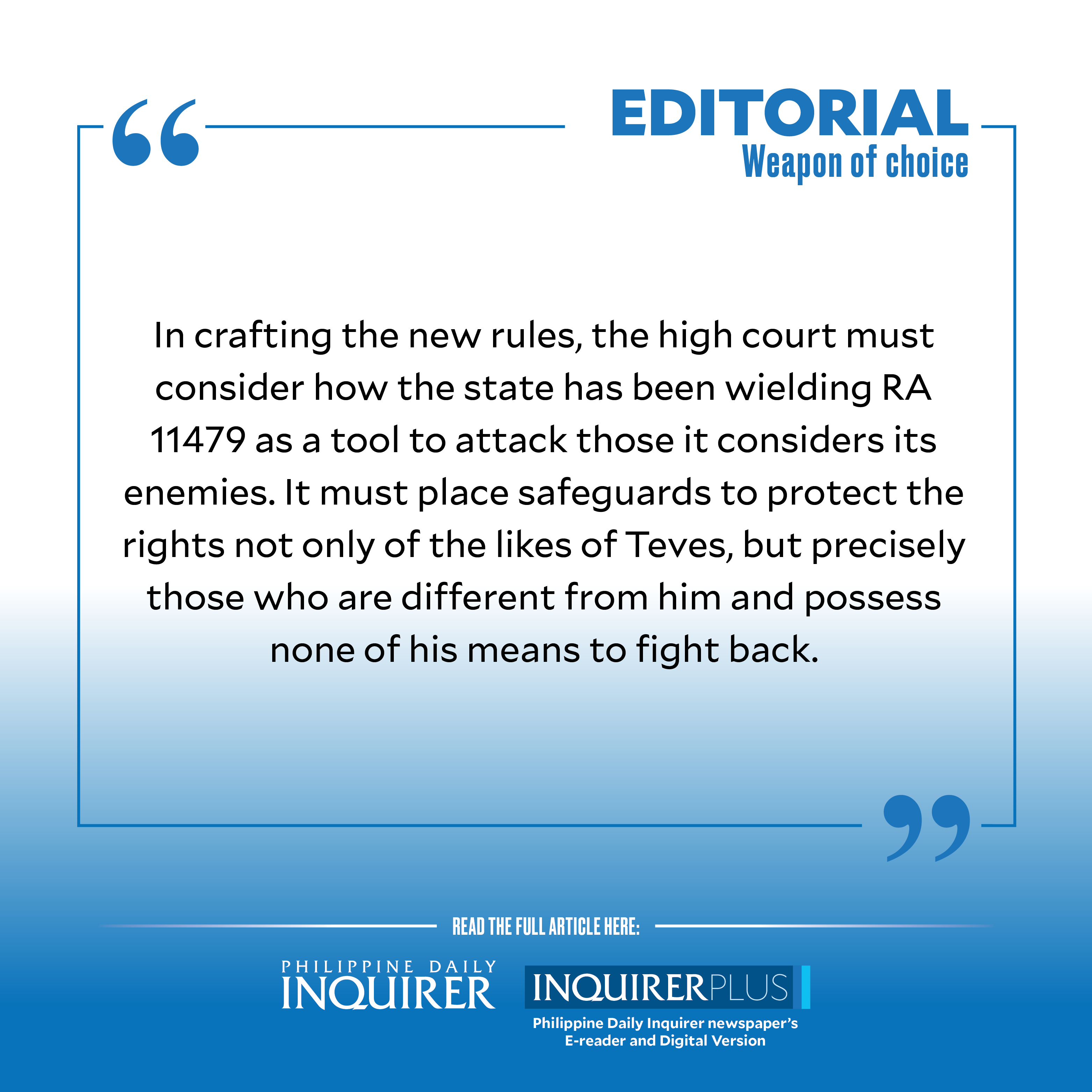
Arnolfo Teves Jr. does not fit the mold of the typical individual who gets branded a terrorist by the Anti-Terrorism Council (ATC). One might even say his identity and background are closer to those of the members of the council itself than its usual suspects.
No one yet has accused the expelled Negros Oriental lawmaker of being a communist insurgent or rebel dissenter, for serving as a rural health worker or fighting for the ancestral rights of indigenous folk. The awful reality is these are the kind of people more likely to suffer the might of the Anti-Terrorism Act of 2020, since it was enacted by Congress three years ago and declared mostly constitutional by the Supreme Court in 2021, which it affirmed in April last year.
Even the magistrates could have scarcely imagined that the law would one day be used on the likes of Teves, who had ruled as a provincial political kingpin for years until his downfall.
For this reason, it’s hard to picture Teves, who faces charges of multiple murder and other crimes, as a blameless victim. It’s clear he is not a powerless figure, despite his recent expulsion from the House of Representatives and the freezing of his assets, as privilege has allowed him to stay abroad for a prolonged period as a fugitive, all while taunting authorities on Facebook.
But for all his faults, Teves is a case study of how the state can bend the law to its will and a stark reminder of why one piece of legislation, whose legality was assailed by a record 37 petitions in the high court, is now fulfilling some of its critics’ worst fears.
Republic Act No. 11479 appears to have become the government’s weapon of choice against any perceived foe, whether it be the community doctor Natividad Castro, who was classified by the ATC as a terrorist in December, or Cordillera activists Sarah Abellon Alikes, Jennifer Awingan Taggaoa, Windel Bolinget, and Stephen Tauli, who received the same tag in June, or, Teves, who became an odd addition to this group on July 26.
Under its Resolution No. 43, the ATC declared Teves, his brother Pryde Henry, and 11 others as terrorists for a series of killings in their province ending with the March 4 assassination of Negros Oriental Gov. Roel Degamo. “These killings and harassment [were] meticulously and deliberately planned and executed for the purpose of intimidating the residents of Negros Oriental as well as to create an atmosphere or spread a message of fear,” read part of the resolution signed by the ATC chair, Executive Secretary Lucas Bersamin.
While there is no question that Teves must return to the country to answer the charges against him, his tagging as a terrorist, to us, is a stretch in credulity and of a government’s power to run after its adversaries.
There are two ways under RA 11479 to be called a terrorist by the state—by designation, as an executive function of the ATC, whose members include the national security adviser and the heads of the foreign, defense, and justice departments, and by proscription of the courts, as a judicial process.
The ATC’s authority to unilaterally declare anybody a terrorist was in fact one of the contentious points during judicial deliberations on the anti-terror law. According to the Supreme Court’s majority decision penned by then Associate Justice Rosmari D. Carandang in December 2021, the provision “confers carte blanche license on the ATC to designate just about anyone that it deems to have met the requirements for designation, dependent as it is on the ATC’s own determination of what it deems as sufficient probable cause.
“[I]t is fairly apparent how this third mode of designation may cause a chilling effect on free speech … As such, [it] equally fails the strict scrutiny and overbreadth tests and … is unconstitutional itself,” Carandang wrote.
Alas, that part of the ponencia striking down the ATC’s function was defeated in an 8-7 vote. In the end, the high court kept RA 11479 intact but for two parts, including a qualifier on a provision exempting protest and advocacy from acts deemed as terrorism.
There is still hope, however, as the Supreme Court is poised to decide on the “Special Rules of Procedure on Anti-Terrorism Cases,” drafted by an ad hoc committee led by retired Chief Justice Reynato Puno.
In May, Chief Justice Alexander Gesmundo made a vow “to protect the fundamental rights of persons and entities from the ill effects brought about by abuses in the implementation of inherently overbroad penal statutes.”In crafting the new rules, the high court must consider how the state has been wielding RA 11479 as a tool to attack those it considers its enemies. It must place safeguards to protect the rights not only of the likes of Teves, but precisely those who are different from him and possess none of his means to fight back.
The law must no longer be weaponized against activists and dissenters, whose sole power lies in their freedom to speak and mobilize in unfettered pursuit of their civil and political rights.

